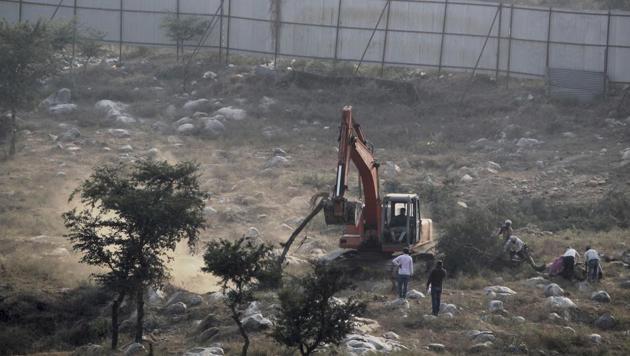Housing project in Aravallis: NGT reviews revenue record, to evaluate forest status on Dec 12
The National Green Tribunal is hearing a plea which contends that the said land in Faridabad comes in the natural conservator zone where construction beyond 0.5% is not allowed. The work on the site was recently put on hold after the state government acted on a complaint by activists
The National Green Tribunal (NGT) on Thursday reviewed the revenue record of the 52-acre group housing project that is pegged to come up in Faridabad’s Sarai Khajwa village, which is part of the ecologically sensitive Aravallis.

The work on the site in question was recently put on hold after the state government acted on a complaint by activists urging it to act against the violators, as the site, which once had around 1,530 trees, now has fewer than 100. On June 21, 2017, more than 10,000 trees and bushes copped the axe. Last week, another 600 were chopped.
The housing project is being built by Bharti Land Ltd.
On Thursday, revenue records showed the land ownership was ‘gair mumnik pahar’ and recorded as ‘Makbuja Malkan’, which implies it is owned by private owners.
However, the real question is whether the land is of forest category; the petitioner had claimed the land on which the housing project has been proposed is ‘deemed forest’.
The tribunal, in its order, stated that “any activity of the project proponent will be subject to the final order of the court”.
The court will review the forest status of the land in the next hearing, which is scheduled for December 12.
The observations came during the green court’s hearing of a plea which contended that the said land comes in the natural conservator zone (NCZ) where construction beyond 0.5% is not allowed.
It is important to note that in December 1996 the Supreme Court (SC) had ruled in the Godavarman judgment that in addition to notified forest, areas recorded as forest in government records will be treated as ‘forest’ for the purpose of the Forest Conservation Act (FCA).
In addition, it held that areas which meet the criteria of dictionary meaning of forest will also be treated as ‘forest’. This was to be applicable irrespective of ownership of the land, and to areas that were earlier forest, but now degraded, denuded or cleared. This conclusion leads to the formation of ‘deemed forest’ terminology.
The environmentalists are of opinion that the private ownership of land was not an issue. “Most of the Aravallis is under private ownership. However, the entire Aravallis comes under NCZ, and, hence, construction activity is banned. Thus, any group housing project in the Aravallis will destroy the entire ecosystem and will further hasten the desertification process,” environmentalist Jitender Bhadana said.
In September, the ministry of environment, forest and climate change (MoEF&CC) had submitted an inquiry report to the NGT stating that the area where more than 10,000 trees were chopped on June 21, for the purpose of development of a group housing society, is a ‘deemed forest’ and the permission of felling trees was incorrect.
Stay updated with all the Breaking News and Latest News from Mumbai. Click here for comprehensive coverage of top Cities including Bengaluru, Delhi, Hyderabad, and more across India along with Stay informed on the latest happenings in World News.
Stay updated with all the Breaking News and Latest News from Mumbai. Click here for comprehensive coverage of top Cities including Bengaluru, Delhi, Hyderabad, and more across India along with Stay informed on the latest happenings in World News.





